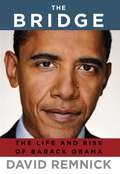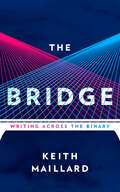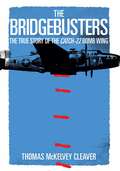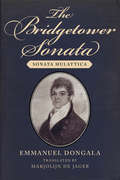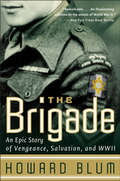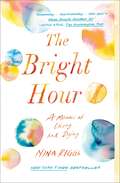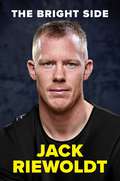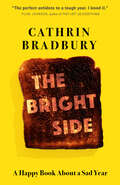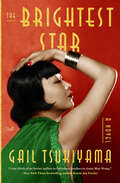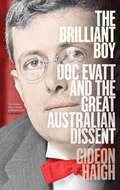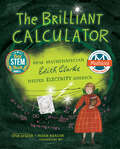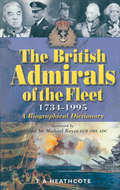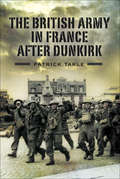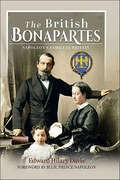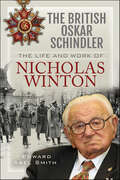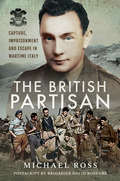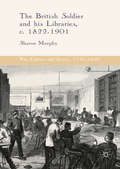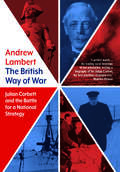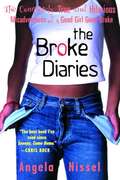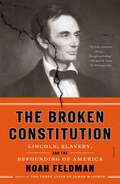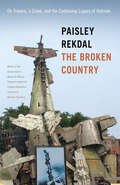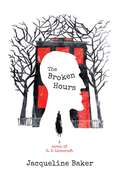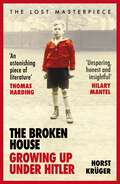- Table View
- List View
The Bridge: The Life and Rise of Barack Obama
by David RemnickThe rise of Barack Obama is one of the great stories of this century: a defining moment for America, and one with truly global resonance. This is the book of his phenomenal journey to election. Through extensive on-the-record interviews with friends and teachers, mentors and disparagers, family members and Obama himself, David Remnick has put together a nuanced, unexpected and masterly portrait of the man who was determined to become the first African-American President. Most importantly, The Bridgeargues that Obama imagined and fashioned an identity for himself against the epic drama of race in America. In a way that Obama's own memoirs cannot, it examines both the personal and political elements of the story, and gives shape not only to a decisive period of history, but also to the way it crucially influenced, animated and motivated a gifted and complex man. 'Speaking to hundreds of friends and colleagues, Remmick investigates and corrects Obama’s own accout of his life with an assured and elegant tone that clarifies rather than accuses or unmasks . . . 600 masterly pages. *****Daily Telegraph 'The publishing event of the year' Observer
The Bridge: Writing Across the Binary
by Keith MaillardOne writer's deeply compelling story of growing up nonbinary in the 1940s and '50sAs a child, Keith Maillard asked his mother and grandmother, over and over again, "Am I a boy, or am I a girl?" Neither "boy" nor "girl" quite fit. But there were no other options. In this stunning memoir, Maillard creates an intricate collage of childhood memories, exploring the contradictory and destructive forces at work that put his very life at risk. For young Keith, writing proved to be a way to fight against what the world was telling him. In his scribbled stories, he began to spot the faintest glimmer that things could be different. And he kept fighting for years -- decades -- until he found a new understanding of his own nonbinary identity. The Bridge reveals the dangers of the gender binary, both for those who are outside it and for those who aren't. And it offers hope for a kinder future for all who dare to say "no" to the way that we do gender.
The Bridgebusters: The True Story of the Catch-22 Bomb Wing
by Thomas Mckelvey Cleaver"He had decided to live forever, or die in the attempt." - Catch-22 <P><P>The men of the 57th Bomb Wing flew out of Corsica during World War II and bombed vital bridges throughout Italy to sabotage German supply routes. Their missions were dangerous and never-ending. <P><P>One bombardier in the wing was a young New Yorker named Joseph Heller, who would later turn his experience into the classic 1961 war novel Catch-22. <P><P>Now aviation historian Thomas McKelvey Cleaver takes a closer look at the real-life men of the 57th, whose camaraderie in the face of death inspired the raucous cast of heroes and antiheros in Catch-22.
The Bridgetower Sonata: Sonata Mulattica
by Emmanuel DongalaIn this vividly imagined, richly detailed historical novel, acclaimed Congolese author Emmanuel Dongala has focused his laser-sharp wit and wry satirical perspective on the life and times of George Bridgetower, a young violin prodigy, who, at the age of nine, took the courtly world of 18th century Europe by storm—and surprise, given the youth's unusual origins: for young George was of mixed- race parentage, known in the parlance of the day as a mulatto. Though his father Augustus was from Barbados and dark-skinned while his mother was a German handmaiden in the Viennese court, this young virtuoso, proclaimed as the "Black Mozart" was welcomed into the high society of Tout-Paris on the eve of the French Revolution, and later, after he and his opportunistic father fled to England, became a court favorite of the Prince of Wales where his fame spread widely across Europe where he eventually arrived in Vienna and became close friends with Ludwig Van Beethoven himself. Despite their fraternal bonding and the fact that they composed and performed the titular sonata together that Beethoven dedicated to his "little Moor", the two had an irreconcilable falling-out due to an unfortunate slight that Bridgetower made about Beethoven's beloved soon-to-be fiancée Josephine—a schism that resulted in Bridgetower's banishment from Ludwig's circle and the removal of his name from the composition's title that the tempestuous composer changed to the "Kreutzer Sonata", to become one of Beethoven's most famous and enduring pieces. Brimming with lively detail and dialogue and with cameo appearances from historical figures such as writer Alexandre Dumas, the early feminist activist Camille Desmoulins, and the early abolitionist author, Nicolas de Condorcet, The Bridgetower Sonata brings to light the issues of race, class, privilege, and with gentle humor reveals the rampant hypocrisy of that era that uncannily mirrors our own.
The Brigade
by Howard Blum Inc. Hardscrabble EntertainmentNovember 1944. The British government finally agrees to send a brigade of 5,000 Jewish volunteers from Palestine to Europe to fight the German army. But when the war ends and the soldiers witness firsthand the horrors their people have suffered in the concentration camps, the men launch a brutal and calculating campaign of vengeance, forming secret squads to identify, locate, and kill Nazi officers in hiding. Their own ferocity threatens to overwhelm them until a fortuitous encounter with an orphaned girl sets the men on a course of action--rescuing Jewish war orphans and transporting them to Palestine--that will not only change their lives but also help create a nation and forever alter the course of world history.
The Brigade: A True Story of War and Salvation
by Howard BlumNovember 1944. The British government finally agrees to send a brigade of 5,000 Jewish volunteers from Palestine to Europe to fight the German army. But when the war ends and the soldiers witness firsthand the horrors their people have suffered in the concentration camps, the men launch a brutal and calculating campaign of vengeance, forming secret squads to identify, locate, and kill Nazi officers in hiding. Their own ferocity threatens to overwhelm them until a fortuitous encounter with an orphaned girl sets the men on a course of action--rescuing Jewish war orphans and transporting them to Palestine--that will not only change their lives but also help create a nation and forever alter the course of world history.
The Bright Hour: A Memoir of Living and Dying
by Nina Riggs* INSTANT NEW YORK TIMES BESTSELLER * &“Stunning…heartrending…this year&’s When Breath Becomes Air.&” —Nora Krug, The Washington Post &“Beautiful and haunting.&” —Matt McCarthy, MD, USA TODAY &“Deeply affecting…simultaneously heartbreaking and funny.&” —People (Book of the Week) &“Vivid, immediate.&” —Laura Collins-Hughes, The Boston Globe Starred reviews from * Kirkus Reviews * Publishers Weekly * Library Journal * Best Books of 2017 Selection by * The Washington Post * Most Anticipated Summer Reading Selection by * The Washington Post * Entertainment Weekly * Glamour * The Seattle Times * Vulture * InStyle * Bookpage * Bookriot * Real Simple * The Atlanta Journal-Constitution * The New York Times bestseller by poet Nina Riggs, mother of two young sons and the direct descendant of Ralph Waldo Emerson, is &“a stunning…heart-rending meditation on life…It is this year&’s When Breath Becomes Air&” (The Washington Post).We are breathless but we love the days. They are promises. They are the only way to walk from one night to the other. Poet and essayist Nina Riggs was just thirty-seven years old when initially diagnosed with breast cancer—one small spot. Within a year, she received the devastating news that her cancer was terminal. How does a dying person learn to live each day &“unattached to outcome&”? How does one approach the moments, big and small, with both love and honesty? How does a young mother and wife prepare her two young children and adored husband for a loss that will shape the rest of their lives? How do we want to be remembered? Exploring motherhood, marriage, friendship, and memory, Nina asks: What makes a meaningful life when one has limited time? &“Profound and poignant&” (O, The Oprah Magazine), The Bright Hour is about how to make the most of all the days, even the painful ones. It&’s about the way literature, especially Nina&’s direct ancestor, Ralph Waldo Emerson, and her other muse, Montaigne, can be a balm and a form of prayer. Brilliantly written and exceptionally moving, it&’s a &“deeply affecting memoir, a simultaneously heartbreaking and funny account of living with loss and the specter of death. As Riggs lyrically, unflinchingly details her reality, she finds beauty and truth that comfort even amid the crushing sadness&” (People, Book of the Week). Tender and heartwarming, The Bright Hour &“is a gentle reminder to cherish each day&” (Entertainment Weekly, Best New Books) and offers us this important perspective: &“You can read a multitude books about how to die, but Riggs, a dying woman, will show you how to live&” (The New York Times Book Review, Editor&’s Choice).
The Bright Side: An AFL champion's story of redemption, fortitude, and positivity
by Jack RiewoldtIn his gritty and inspirational memoir, Jack Riewoldt reveals all about his remarkable AFL career and his personal journey of growth off the field. Jack grew up in picturesque Tasmania, playing sport with his family and admiring his older cousin Nick. When Nick was drafted in the AFL, Jack&’s focus shifted to footy, and that competitive drive helped Jack become one of Richmond&’s most beloved and prolific players.The Bright Side dives into every important win, including Richmond&’s recent premierships, as well as the losses that helped Jack learn and build resilience. Jack&’s positive attitude has helped him overcome a brush with cancer, the loss of his much-loved cousin Maddie – sister of Nick Riewoldt, with whom Jack remains a spokesman for the charity in her name – and the misunderstanding that has dogged much of his career. In The Bright Side, Jack finally corrects some of the misperceptions. From mischievous youngster to revered leader of the game, it&’s family and community that has pulled Jack through, and allowed him to become an AFL legend.The book includes a foreword by Gerard Whateley.
The Bright Side: Twelve Months, Three Heartbreaks, and One (Maybe) Miracle
by Cathrin Bradbury"Anyone who has had their life completely gutted and rewired will adore this family story. Bradbury's dark humour and gloriously upbeat voice makes it the perfect antidote to a tough year. I loved it!"--Plum Johnson, author of They Left Us EverythingThe hilarious and moving story of how a modern woman's life can change utterly in a single year--and how, even when life whacks you in the head, you can find yourself rewarded with grace.Cathrin Bradbury's life imploded in the space of a few months. Her beloved parents died, her marriage limped to an end after twenty-five years, her heavily mortgaged house turned against her, and a promising new romance ended in crushing disappointment. But somewhere in that year, a new path, or three or four, began to open up. As Bradbury navigates the setbacks, her troubled brother makes an astounding recovery to health and sobriety. She is reunited with her closest childhood friend after a long absence, with deeply satisfying results. She and her four siblings feel their way to becoming a new kind of family without their parents. And her adult children emerge into sharper focus, each gloriously and uniquely themselves. Slowly, she discovers that the path is steep, the view obscured, but there's light ahead. Cathartic, hilarious, and profoundly moving, The Bright Side broadens the way we think and talk to each other about the ordinary experiences we all share. A master of the uncomplaining voice, Bradbury combines grace and humanity to look at the world unflinchingly and see what makes it wonderful and absurd at the same time, and to let us all in on the secret.
The Brightest Star: A Novel
by Gail TsukiyamaA LIBRARYREADS PICK AND BEST BOOK CLUB PICK OF 2023. The beloved bestselling author of The Color of Air, Women of the Silk, and The Samurai's Garden returns with this magnificent historical novel based on the life of the luminous, groundbreaking actress Anna May Wong—the first and only Asian American woman to gain movie stardom in the early days of Hollywood.At the dawn of a new century, America is falling in love with silent movies, including young Wong Liu Tsong. The daughter of Chinese immigrants who own a laundry, Wong Liu and her older sister Lew Ying (Lulu) are taunted and bullied for their Chinese heritage. But while Lulu diligently obeys her parents and learns to speak Chinese, Wong Liu sneaks away to the local nickelodeons, buying a ticket with her lunch money and tips saved from laundry deliveries. By eleven Wong Liu is determined to become an actress and has already chosen a stage name: Anna May Wong. At sixteen, Anna May leaves high school to pursue her Hollywood dreams, defying her disapproving father and her Chinese traditional upbringing—a choice that will hold emotional and physical consequences.After a series of nothing parts, nineteen-year-old Anna May gets her big break—and her first taste of Hollywood fame—starring opposite Douglas Fairbanks in The Thief of Bagdad. Yet her beauty and talent isn’t enough to overcome the racism that relegates her to supporting roles as a helpless, exotic butterfly or a vicious, murderous dragon lady while Caucasian actresses in yellowface” are given starring roles portraying Asian women. Though she suffers professionally and personally, Anna May fights to win lead roles, accept risqué parts, financially support her family, and keep her illicit love affairs hidden—even as she finds freedom and glittering stardom abroad, and receives glowing reviews across the globe.Powerful, poignant, and imbued with Gail Tsukiyama's warmth and empathy, The Brightest Star reimagines the life of the first Asian American screen star whose legacy endures—a remarkable and inspiring woman who broke barriers and became a shining light in Hollywood history.
The Brilliant Boy: Doc Evatt and the Great Australian Dissent
by Gideon HaighIn a quiet Sydney street in 1937, a seven year-old immigrant boy drowned in a ditch that had filled with rain after being left unfenced by council workers. How the law should deal with the trauma of the family&’s loss was one of the most complex and controversial cases to reach Australia&’s High Court, where it seized the imagination of its youngest and cleverest member. These days, &‘Doc&’ Evatt is remembered mainly as the hapless and divisive opposition leader during the long ascendancy of his great rival Sir Robert Menzies. Yet long before we spoke of &‘public intellectuals&’, Evatt was one: a dashing advocate, an inspired jurist, an outspoken opinion maker, one of our first popular historians and the nation&’s foremost champion of modern art. Through Evatt&’s innovative and empathic decision in Chester v the Council of Waverley Municipality, which argued for the law to acknowledge inner suffering as it did physical injury, Gideon Haigh rediscovers the most brilliant Australian of his day, a patriot with a vision of his country charting its own path and being its own example – the same attitude he brought to being the only Australian president of the UN General Assembly, and instrumental in the foundation of Israel. A feat of remarkable historical perception, deep research and masterful storytelling, The Brilliant Boy confirms Gideon Haigh as one of our finest writers of non-fiction. It shows Australia in a rare light, as a genuinely clever country prepared to contest big ideas and face the future confidently. 'Here is a master craftsman delivering one of his most finely honed works. Meticulous in its research, humane in its storytelling, The Brilliant Boy is Gideon Haigh at his lush, luminous best. Haigh shines a light on person, place and era with the sheer force of his intellect and the generosity of his words. The Brilliant Boy is simply a brilliant book.' Clare Wright, Stella-Prize winning author of The Forgotten Rebels of Eureka 'Gideon Haigh is one of Australia&’s most versatile and skilled historians.' Geoffrey Blainey 'This new biography of HV Evatt lifts the lid on his early life as a brilliant barrister and creative Justice of the High Court of Australia. It reveals the wellsprings that gave birth to his humanitarian and internationalist values that later helped in the creation of the United Nations. It helps to explain Evatt's valiant defence of liberty in fighting off the attempt to ban the communists in Australia. We need to constantly renew our acquaintance with such values. This book reminds us of Evatt's flawed genius but deep motivations, lest we ever forget.' The Hon Michael Kirby AC CMG
The Brilliant Calculator: How Mathematician Edith Clarke Helped Electrify America
by Jan LowerHidden Figures meets Rosie Revere, Engineer in this STEM/STEAM picture book about Edith Clarke, the innovator who solved an electrical mystery and built the first graphing calculator—from paper!Long before calculators were invented, little Edith Clarke devoured numbers, conquered calculations, cracked puzzles, and breezed through brainteasers. Edith wanted to be an engineer—to use the numbers she saw all around her to help build America.When she grew up, no one would hire a woman engineer. But that didn&’t stop Edith from following her passion and putting her lightning-quick mind to the problem of electricity. But the calculations took so long! Always curious, Edith couldn&’t help thinking of better ways to do things. She constructed a &“calculator&” from paper that was ten times faster than doing all that math by hand! Her invention won her a job, making her the first woman electrical engineer in America. And because Edith shared her knowledge with others, her calculator helped electrify America, bringing telephones and light across the nation.
The British Admirals of the Fleet, 1734–1995: A Biographical Dictionary
by T. A. HeathcoteA companion volume to the same author's "The British Field Marshals 1736–1997", this book outlines the lives of the 115 officers who held the rank of Admiral of the Fleet in the Royal Navy from 1734, when it took its modern form, to 1995, when the last one was appointed. Each entry gives details of the dates of the birth and death of its subjects, their careers ashore and afloat, their family backgrounds, and the ships, campaigns and combats in which they served. Each is placed clearly in its domestic or international political context. The actions recorded include major fleet battles under sail or steam, single-ship duels, encounters with pirates on the Spanish Main and up the rivers of Borneo, the suppression of the Slave Trade (for which the Navy receives little gratitude), landing parties to deal with local dictators and revolutionaries, and the services of naval brigades in China, Egypt and South Africa.
The British Army in France After Dunkirk
by Patrick TakleAlthough over 330,000 British and French soldiers were evacuated from the Dunkirk beaches between 26 May and 4 June, many thousands remained in France, most under French command. Churchill, now the Prime Minister, and desperate to keep the French in the War, decided to form a Second BEF made up of 51 Highland, 1st Armoured and the Beauman Divisions, reinforced from the UK by a second Corps. He also ordered vital and scarce RAF fighter squadrons to France. Had these been lost the Battle of Britain might have had a very different result. General Alan Brooke was to command the second Corps comprising the only viable formations in the UK. Realizing the hopelessness of his mission he delayed for as long as possible. Meanwhile the situation in France went from bad to worse and five units were squandered. At St Valery 800 of the 51st Highland Division surrendered after heavy fighting and being outflanked by Rommel. This is the fascinating story of a disaster that could have been so much worse had Churchill had his way.
The British Bonapartes: Napoleon’s Family in Britain
by Edward Hilary DavisA hitherto unexamined history of the wider Bonaparte family, presented in a new way and shedding fresh light on their eventful lives in Britain. From duels on Wimbledon Common and attempted suicides in Hyde Park, to public brawls and arrests in Shropshire and the sexual adventures of a princess who rescued Freud from the Nazis and brought him to Britain, this book exposes the curious events surrounding the family’s exploits in England, Scotland and Ireland. Originally an island family themselves, the Bonapartes have had a surprisingly good relationship with the British Isles. In just two generations, the Bonapartes went from being Britain’s worst enemy to one of Queen Victoria’s closest of friends. Far from another mere history of Napoleon Bonaparte, this book is divided into different branches of the Bonaparte family, detailing – in an anecdotal and amusing way – their rather scandalous lives in Britain. For example, few will know that Napoleon III was once a volunteer constable in London and arrested a drunk woman; or that Princess Marie Bonaparte sponsored Prince Philip’s education as well as conducted her own research into the clitoris in her quest to achieve an orgasm; or that Napoleon IV fought for the British army and was killed by the Zulus; or that one Bonaparte was even made a High Sheriff in a British town. Today, the head of the family is London-based and works in finance. The Bonapartes are known to most as the enemies of Britain, but the truth is quite the opposite, and far more entertaining.
The British Oskar Schindler: The Life and Work of Nicholas Winton
by Edward Abel SmithWhen Nicholas Winton canceled his skiing holiday in favor of going to Prague to visit a friend, little did he know this decision would change the course of thousands of lives, including his own. As millions of Jewish families attempted to flee the growing clutches of the brutal Nazi war of terror, this twenty-nine-year-old stockbroker decided to act, pulling off one of the most remarkable rescue missions of the century. The British Oskar Schindler tells the story of this remarkable man’s life and those around him who helped him to achieve all he did.
The British Partisan: Capture, Imprisonment and Escape in Wartime Italy
by Michael RossAn exciting, evocative memoir of combat in North Africa, danger behind enemy lines, and two daring escapes. In this action-packed account, a Welch Regiment officer describes his remarkable Second World War experiences. These include his baptism by fire in the Western Desert against Rommel&’s armor in 1942; the spontaneous help of nomad Arabs when he was on the run for ten days behind enemy lines; and his capture and life as a POW in Italy. Michael Ross and a fellow officer made the first escape from Fontanellato POW camp only to be recaptured on the Swiss border. During his second escape, Ross fought against the occupying German forces in north Italy alongside the Italian partisans, who nearly executed him initially. He avoided recapture for over a year before finally reaching Allied lines. The reader learns of the extraordinary courage and sacrifice of local Italians helping and hiding Allied soldiers. Ross&’s story has a poignant conclusion as, while on the run, he fell in love with a prominent anti-fascist&’s daughter whom he married after the war. Originally published as From Liguria With Love, this superbly written and updated memoir is a powerful and inspiring tribute to all those who risked their lives to help him and his comrades.
The British Soldier and his Libraries, c. 1822-1901
by Sharon MurphyThe British Soldier and his Libraries, c. 1822-1901 considers the history of the libraries that the East India Company and Regular Army respectively established for soldiers during the nineteenth century. Drawing upon a wide range of material, including archival sources, official reports, and soldiers' memoirs and letters, this book explores the motivations of those who were responsible for the setting up and/or operation of the libraries, and examines what they reveal about attitudes to military readers in particular and, more broadly, to working-class readers - and leisure - at this period. Murphy's study also considers the contents of the libraries, identifying what kinds of works were provided for soldiers and where and how they read them. In so doing, The British Soldier and his Libraries, c. 1822-1901 affords another way of thinking about some of the key debates that mark book history today, and illuminates areas of interest to the general reader as well as to literary critics and military and cultural historians.
The British Way of War: Julian Corbett and the Battle for a National Strategy
by Andrew LambertHow a strategist's ideas were catastrophically ignored in 1914—but shaped Britain&’s success in the Second World War and beyond Leading historian Andrew Lambert shows how, as a lawyer, civilian, and Liberal, Julian Corbett (1854–1922) brought a new level of logic, advocacy, and intellectual precision to the development of strategy. Corbett skillfully integrated classical strategic theory, British history, and emerging trends in technology, geopolitics, and conflict to prepare the British state for war. He emphasized that strategy is a unique national construct, rather than a set of universal principles, and recognized the importance of domestic social reform and the evolving British Commonwealth. Corbett's concept of a maritime strategy, dominated by the control of global communications and economic war, survived the debacle of 1914–18, when Britain used the German "way of war" at unprecedented cost in lives and resources. It proved critical in the Second World War, shaping Churchill&’s conduct of the conflict from the Fall of France to D-Day. And as Lambert shows, Corbett&’s ideas continue to influence British thinking.
The Broke Diaries
by Angela Nissel“People always say I’m going to look back on these days and laugh — why put it off?” When Angela Nissel found herself struggling financially while in college, instead of sulking, she decided to entertain herself by creating an online journal that chronicled her day-to-day trials and tribulations. Written with humor and intelligence, her “Broke Diary” quickly found an audience as people wrote to Angela to empathize with, console, and laugh with her about her experiences and even share their own. The Bro...
The Broke Diaries: The Completely True and Hilarious Misadventures of a Good Girl Gone Broke
by Angela Nissel"People always say I'm going to look back on these days and laugh -- why put it off?"When Angela Nissel found herself struggling financially while in college, instead of sulking, she decided to entertain herself by creating an online journal that chronicled her day-to-day trials and tribulations. Written with humor and intelligence, her "Broke Diary" quickly found an audience as people wrote to Angela to empathize with, console, and laugh with her about her experiences and even share their own. The Broke Diaries is the first complete compilation of her experiences, written in a voice that is funny, unique, and dead-on.On buying ramen noodles: I am sooooooo embarassed. I only have 33 cents. I (please don't laugh) put the money on the counter and quickly attempt to dash out with my Chicken Flavored Salt Noodles. The guy calls me back! I look up instinctively, I should have run . . . Why didn't I run???!! He tells me the noodles are 35 cents. I try to apologize sincerely. I thought the sign said 33 cents yesterday, so that's all I brought with me. Could he wait while I ran home and get the 2 cents? I show him my student I.D. to let him know I am not a thief. He shakes his head and motions either for me to get the hell out of his store and never come back again or get the money as do come back. I don't know. He said something like "Nyeh" and swiped his hand in my direction. I can't translate hand motions well.The noodles: tasty!!!
The Broken Constitution: Lincoln, Slavery, and the Refounding of America
by Noah FeldmanA New York Times Book Review Editors' ChoiceAn innovative account of Abraham Lincoln, constitutional thinker and doerAbraham Lincoln is justly revered for his brilliance, compassion, humor, and rededication of the United States to achieving liberty and justice for all. He led the nation into a bloody civil war to uphold the system of government established by the US Constitution—a system he regarded as the “last best hope of mankind.” But how did Lincoln understand the Constitution?In this groundbreaking study, Noah Feldman argues that Lincoln deliberately and recurrently violated the United States’ founding arrangements. When he came to power, it was widely believed that the federal government could not use armed force to prevent a state from seceding. It was also assumed that basic civil liberties could be suspended in a rebellion by Congress but not by the president, and that the federal government had no authority over slavery in states where it existed. As president, Lincoln broke decisively with all these precedents, and effectively rewrote the Constitution’s place in the American system. Before the Civil War, the Constitution was best understood as a compromise pact—a rough and ready deal between states that allowed the Union to form and function. After Lincoln, the Constitution came to be seen as a sacred text—a transcendent statement of the nation’s highest ideals.The Broken Constitution is the first book to tell the story of how Lincoln broke the Constitution in order to remake it. To do so, it offers a riveting narrative of his constitutional choices and how he made them—and places Lincoln in the rich context of thinking of the time, from African American abolitionists to Lincoln’s Republican rivals and Secessionist ideologues.Includes 8 Pages of Black-and-White Illustrations
The Broken Country: On Trauma, a Crime, and the Continuing Legacy of Vietnam (Association of Writers and Writing Programs Award for Creative Nonfiction Series #30)
by Paisley RekdalAn attack in a grocery store parking lot launches an examination of the Vietnam War&’s dark legacy—by the author of The Night My Mother Met Bruce Lee.The Broken Country uses a violent incident that took place in Salt Lake City, Utah, in 2012 as a springboard for examining the long-term cultural and psychological effects of the Vietnam War. To make sense of the shocking and baffling incident—in which a young homeless man born in Vietnam stabbed a number of white men purportedly in retribution for the war—Paisley Rekdal draws on a remarkable range of material and fashions it into a compelling account of the dislocations suffered by the Vietnamese and also by American-born veterans over the past decades. She interweaves a narrative about the crime with information collected in interviews, historical examination of the arrival of Vietnamese immigrants in the 1970s, a critique of portrayals of Vietnam in American popular culture, and discussions of the psychological consequences of trauma. This work allows us to better understand transgenerational and cultural trauma and advances our still complicated struggle to comprehend the war. &“A moving and often gripping meditation on the fallout of war, from violence and racism to melancholy and trauma.&”—Viet Thanh Nguyen, Pulitzer Prize–winning author of The Refugees &“Assembling a remarkable range of materials and testimonies, she shows us both the persistence of war&’s trauma and how we might more ethically imagine those it harms.&”—Beth Loffreda, author of Losing Matt Shepard: Life and Politics in the Aftermath of Anti-Gay Murder &“A compact, thoughtful debut addressing violence, immigrant identity, and the long shadow of the Vietnam War…. A poignant, relevant synthesis of cultural studies and true-crime drama.—Kirkus Reviews
The Broken Hours: A Novel of H. P. Lovecraft
by Jacqueline BakerDesperation drives an impoverished man into a dark realm in this chilling homage to H. P. Lovecraft by the award-winning author of The Horseman’s Grave. In the cold spring of 1936, Arthor Crandle accepts a position in Providence, Rhode Island, working as a live-in secretary for an unnamed shut-in—an author of unsettlingly bizarre fiction whose severely poor health has confined him to his bedroom. This writer, who Crandle knows only as “Ech-Pi,” refuses to meet him in person, communicating only by letters left outside his room. Soon, the home reveals other unnerving peculiarities. Crandle feels an ominous presence on the main stairwell. Light that shines from underneath the door of his employer’s room is invisible from the street. And then there are the haunting visions of a young girl in a white nightgown wandering the walled-in garden behind the house. As Crandle investigates his employer’s dark family history, he finds himself pulled into a world cut off from reality, into black depths, where an unspeakable secret lies waiting.
The Broken House: Growing up Under Hitler – The Lost Masterpiece
by Horst Krüger'Exquisitely written... haunting... Few books, I think, capture so well the sense of a life broken for ever by trauma and guilt' Sunday Times 'An unsparing, honest and insightful memoir, that shows how private failure becomes national disaster' Hilary MantelTwenty years after the end of the war, Horst Krüger attempted to make sense of his childhood. He had grown up in a quiet Berlin suburb. Here, people lived ordinary lives, believed in God, obeyed the law, and were gradually seduced by the promises of Nazism. He had been 'the typical child of innocuous Germans who were never Nazis, and without whom the Nazis would never have been able to do their work'. With tragic inevitability, this world of respectability, order and duty began to crumble.Written in accomplished prose of lingering beauty, The Broken House is a moving coming-of-age story that provides a searing portrait of life under the Nazis.
